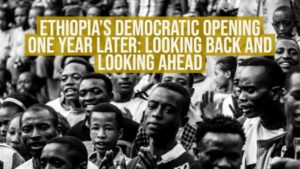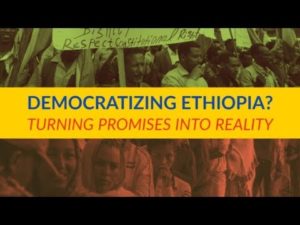 The ascension of Abiy Ahmed as Ethiopia’s Prime Minister on April 2, 2018, following the massive popular protests of the previous two years, has produced one of the most surprising and important breakthroughs for democracy in the world today, according to a leading democracy practitioner.
The ascension of Abiy Ahmed as Ethiopia’s Prime Minister on April 2, 2018, following the massive popular protests of the previous two years, has produced one of the most surprising and important breakthroughs for democracy in the world today, according to a leading democracy practitioner.
The release of thousands of political prisoners, the re-opening of democratic space for civil society and political parties, the commitment to free elections, the liberalization of the media, economic reforms, and détente with Eritrea have all made it clear that the current government is serious about the democratic transformation of Ethiopia. But there is no magic formula for building democracy, said Carl Gershman, President of the National Endowment for Democracy.
Ethiopia’s transformation from autocracy to democracy is of great consequence and deserves the support of the world’s democracies. As the seat of the Africa Union, a democratic Ethiopia could emerge as a key member of the global coalition of democracies, playing a leadership role on the continent and inspiring democrats around the world, he told a conference in Addis Ababa this week:
 Ethiopia’s rich ethnic and cultural heterogeneity can be a source of both conflict and strength. The political will of your leadership and the demands of the people must be matched by the building of effective and accountable institutions, and by peaceful and responsible political discourse. Ethiopia will have to chart its own path to democracy, which has so many different dimensions – an election system that ensures that voting is free and fair, and political parties that are representative and competitive; an independent judiciary; a free media; a democratic constitution; a federal structure that balances decentralization and ethnic diversity with national cohesion; a productive economy that provides opportunity and well-being for everyone; a competent civil service; a professional military; a vibrant civil society that enables young people, women, and minorities to have a voice; and so much more.
Ethiopia’s rich ethnic and cultural heterogeneity can be a source of both conflict and strength. The political will of your leadership and the demands of the people must be matched by the building of effective and accountable institutions, and by peaceful and responsible political discourse. Ethiopia will have to chart its own path to democracy, which has so many different dimensions – an election system that ensures that voting is free and fair, and political parties that are representative and competitive; an independent judiciary; a free media; a democratic constitution; a federal structure that balances decentralization and ethnic diversity with national cohesion; a productive economy that provides opportunity and well-being for everyone; a competent civil service; a professional military; a vibrant civil society that enables young people, women, and minorities to have a voice; and so much more.
 At a time when democracy in many countries is being threatened by malignant nationalism, illiberal populism, and religious extremism, Ethiopia can be a model of civic nationalism and show that it is possible for a multi-ethnic country to build an inclusive system that allows people to be themselves, and that celebrates ethnic diversity while protecting universal rights, Gershman (right) added.
At a time when democracy in many countries is being threatened by malignant nationalism, illiberal populism, and religious extremism, Ethiopia can be a model of civic nationalism and show that it is possible for a multi-ethnic country to build an inclusive system that allows people to be themselves, and that celebrates ethnic diversity while protecting universal rights, Gershman (right) added.
Ethiopia’s dynamic young Prime Minister has dramatically opened political space, departing from decades of repressive, tightly controlled government, adds Council on Foreign Relations analyst Michelle Gavin. Abiy is a charismatic whirlwind of activity—making peace with neighboring Eritrea, working to open the Ethiopian economy to new opportunities for growth, and even mediating between protestors and securocrats in Sudan. Anyone who cares about stability and prosperity in Africa, and anyone who understands how important African partnership will be to tackle the foreign policy challenges of the future, is pulling for him to succeed.
In the past 15 months, Abiy has introduced a “blitzkrieg of reforms,” said Johnnie Carson, the U.S. Institute of Peace senior advisor on Africa, in remarks opening a discussion at the US Institute for Peace. After 25 years of rule by the coalition of parties known as the Ethiopian People’s Revolutionary Democratic Front (EPRDF), the 42-year old reformist politician has lifted the state of emergency under which it governed and promised to break up and privatize the inefficient state-owned holding companies that strangled Ethiopia’s economy, Carson said.







